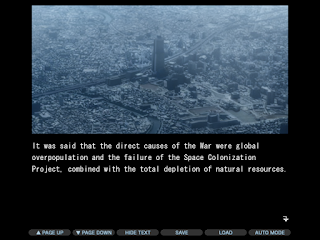Original title: planetarian ~ちいさなほしのゆめ~
Alias: planetarian -Dream of Little Star-
Release date: 2004-11-29
English release date: 2005-02-28 (as a fan-patch)
2013-01-07 (official iOS release)
2014-09-12 (official Steam release)
Developer: KeyEnglish publisher: Insani/Haeleth (fan-patch)
Key (iOS release)
Sekai Project (Steam release)
Ah, "planetarian" - probably one of the more important Japanese VN translation projects. Somehow it still remains relevant to the community, despite its age and the fact that everyone and their mother-in-law have already played the game.
"planetarian" was historically the very first commercial Japanese VN fan-translation project that saw its completion. Sure, it's a pretty short game, but still, it opened the gates for VNs like "Wind" and "Tsukihime", that arrived a year and a year and half later respectively. If that wasn't enough, the game managed to repeat its feat almost ten years later, when it became the first high profile visual novel to get on Steam. Even though by that point its developer Key had already released the English localization of "planetarian" on iOS platforms, this event still served as a turning point for both Steam's acceptance of visual novels on its platform and Key's willingness to deal with Western publishers.
 |
| Lots of reasons for that one. |
An interesting trivia is that "planetarian" introduced a new phrase into the English language. The game was first conceived under a new VisualArt's Kinetic Novel brand. The brand was supposed to only produce visual novels with no interactivity, basically being books with pictures and sound. "planetarian" popularized the brand name in mainstream use and nowadays "kinetic novel" is a title generally used for any visual novel with no choices and no gameplay.
 |
| Aww, that's so heartwarming. |
The post-apocalyptic world after the Third World War. A lone nameless scavenger, called "junker" (no connection to Snatcher) in the game, is trudging through a walled-off lifeless city. His attention is attracted by the only building in the game that still apparently has electrical power... a building that turns out to be the Planetarium. Once inside he is surprised by the appearance of a humanoid robot Hoshino Yumemi, who is a caretaker of the place. The non-stop chatterbox robot seems to be in denial about the end of the world. Every day she waits for customers to enter the place and blames the lack of them on economic depression and the Planetariums going out of fashion. Almost against his will, the junker is pulled into Yumemi's pace and starts fixing the broken projection device in order to restart the Planetarium.
 |
| Yumemi wants to help. |
We don't find out many details about the war, we are provided only the most barebones information, but that is never the centre of the novel. It brings a sharp focus on the interactions between the junker and Yumemi - on two strangers, whose coincidental meeting changes them both. There are some plot devices that are hard to swallow, though. The junker hangs a lampshade on the fact that he managed to arrive at the Planetarium within the short time frame when Yumemi is active and the power that fed the place for the last 30 years has suddenly died at the same time. Even the lampshade doesn't make it any more believable.
 |
| And teachers go to the Great Break, according to Terry Pratchett. |
There is a lot to like in "planetarian". Both the junker and the robot feel real and tangible. Their interactions range from happy to awkward to sad and never feel stilted or unnatural. Yumemi always feels distinctly robot-like in her behaviour and not just like a girl we are told is a robot. The ending, while predictable, still tugs at the right heart-strings. The minimalistic graphical presentation is gorgeous and works incredibly well in portraying the world, and the voice acting is fantastic. Though it begs to mention that the first Japanese releases of the game only had partial voice acting. Full voicing was only introduced in the PS2 edition of the game.
 |
| Be truthful, developers, you just wanted a clumsy robot. |
P.S. Sekai Project has to have their collective asses canned due to the inclusion of DRM into the game. According to the chatter on the Net, after the release, "planetarian" had no DRM and could be played without Steam. That is not true anymore - if you dislike Steam as much as I do, you'll have to use SmartSteamEmu to launch the game. Not cool Sekai Project, not cool at all!
Links of Interest
Visual Novel Database
Official Japanese site
Planetarian Insani site / site No. 2
Buy the bilingual iOS release
Official Sekai Project page
Steam store page
The page for SmartSteamEmu
Final Verdict: 70%

Unfortunately, the addition of the Steam "easy refund!" system is pushing a lot of developers to add DRM to titles that didn't previously have it. Especially after a number of people on 4chan openly bragged about buying games, getting the money back, and continuing to play.
ReplyDeletePS: blogspot wants me to prove i'm not a robot to post this. T_T